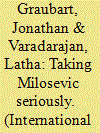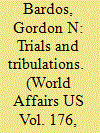| Srl | Item |
| 1 |
ID:
074225


|
|
|
|
|
| Publication |
2005.
|
| Summary/Abstract |
The tenth anniversary of the massacre of 7–8,000 Bosnian Muslim men and boys at Srebrenica in July 1995 set in stark relief the continuing salience of war crimes in the political life of Bosnia and Herzegovina. With the country now firmly on a path ‘from Dayton to Brussels’, dealing with the war crimes legacy is critical to its future development. Cooperation with the International Criminal Tribunal for the Former Yugoslavia (ICTY) is a non-negotiable condition for further progress toward membership of the European Union and NATO's Partnership for Peace, while in the long-term, dealing with the legacy of war crimes is crucial to establishing lasting peace in Bosnia and in the region. This article examines the potential contribution of the ICTY to the restoration of peace in Bosnia in the context of debates about the role of post-conflict justice in societies in transition from war to peace and in the context of the international community's use of the war crimes issues as a political bargaining tool. It will be argued that the two are inextricably linked as short-term pragmatic advantages brought by cooperation work in tandem with longer-term goals of peace and reconciliation.
|
|
|
|
|
|
|
|
|
|
|
|
|
|
|
|
| 2 |
ID:
127010


|
|
|
|
|
| Publication |
2013.
|
| Summary/Abstract |
Notwithstanding his premature death, the trial of Slobodan Milosevic is widely hailed as a landmark moment in the development of international criminal law. To many, the trial, in conjunction with the broader record of the International Criminal Tribunal for the former Yugoslavia (ICTY), represents the beginning of a new era of global justice characterized by the impending triumph of law over politics. This article dissents from the prevailing consensus by emphasizing the enduring role of imperialist relations in shaping international relations. Without defending Milosevic, we provide a critical reassessment of the ICTY's most celebrated trial. We do so to reveal the manner in which seemingly progressive legal institutions - far from furthering an abstract notion of justice - serve to re-inscribe a violent and highly unequal post-Cold War imperialist world order. Because the ICTY is far from a sui generis experience, we argue that it is critical to take Milosevic seriously in making sense of the nature and implications of global tribunals.
|
|
|
|
|
|
|
|
|
|
|
|
|
|
|
|
| 3 |
ID:
125212


|
|
|
|
|
| Publication |
2013.
|
| Summary/Abstract |
Frederik Harhoff, a justice at the International Criminal Tribunal for the Former Yugoslavia (ICTY), recently charged that the American presiding judge at the tribunal pressured his colleagues to overturn decisions related to war crimes-cases in Croatia and Serbia. Harhoff's allegations subsequently triggered a number of similar accusations of political interference by tribunal insiders and observers. All of this reinforced what many observers have claimed throughout the ICTY's twenty-year existence-that to unacceptable degrees, the tribunal's work is determined not by impartial standards of justice, but by the great powers' political interests.
|
|
|
|
|
|
|
|
|
|
|
|
|
|
|
|